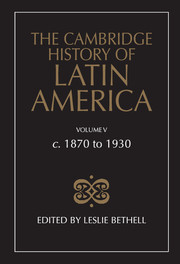Book contents
- Frontmatter
- PART ONE MEXICO
- PART TWO CENTRAL AMERICA AND THE CARIBBEAN
- PART THREE THE RIVER PLATE REPUBLICS
- PART FOUR THE ANDEAN REPUBLICSo
- 15 Chile from the War of the Pacific to the world depression, 1880–1930
- 16 Bolivia from the War of the Pacific to the Chaco War, 1880–1932
- 17 The origins of modern Peru, 1880–1930
- 18 Colombia, Ecuador and Venezuela, c. 1880–1930
- PART FIVE BRAZIL
- Bibliographical essays
16 - Bolivia from the War of the Pacific to the Chaco War, 1880–1932
from PART FOUR - THE ANDEAN REPUBLICSo
Published online by Cambridge University Press: 28 March 2008
- Frontmatter
- PART ONE MEXICO
- PART TWO CENTRAL AMERICA AND THE CARIBBEAN
- PART THREE THE RIVER PLATE REPUBLICS
- PART FOUR THE ANDEAN REPUBLICSo
- 15 Chile from the War of the Pacific to the world depression, 1880–1930
- 16 Bolivia from the War of the Pacific to the Chaco War, 1880–1932
- 17 The origins of modern Peru, 1880–1930
- 18 Colombia, Ecuador and Venezuela, c. 1880–1930
- PART FIVE BRAZIL
- Bibliographical essays
Summary
The year 1880 marked a major turning point in Bolivian history. The most dramatic event was the total defeat of Bolivia's army at the hands of the Chilean invaders and the loss of its entire coastal territory in the War of the Pacific. Less dramatic but equally important was the establishment of a new government to replace the previous caudillo regime. Though the replacement of governments by military coups had not been an uncommon feature of political life in the Republic during the half century since its creation, the new regime did in fact mark a fundamental change in national political development. It represented the first viable republican government of a civilian oligarchic nature. Though the loss of its direct access to the sea remained the most intransigent of Bolivia's international problems from 1880 to the present day, the establishment of a modern political party system and a civilian-dominated government led to political, economic and eventually even social and cultural changes which profoundly shaped Bolivia's historical evolution.
The fundamental stabilization and maturation of Bolivian politics after 1880 was not the result of the war with Chile, but rather derived from basic changes within the Bolivian economy that had begun at least 30 years previously. Whereas Bolivia had been a major mineral exporter throughout the period of colonial Spanish domination, it emerged in the republican period as a minor exporter of silver and other minerals. The collapse of the imperial economy in the 1790s, the regional agricultural disasters of 1804 and 1805, the devastation of the civil wars and international conflicts of the independence period (1809–25), the breakup of the imperial customs union, and finally the collapse of the mita system of forced labour after 1825 all contributed to the decline of the silver mining industry.
- Type
- Chapter
- Information
- The Cambridge History of Latin America , pp. 553 - 586Publisher: Cambridge University PressPrint publication year: 1986
- 2
- Cited by

